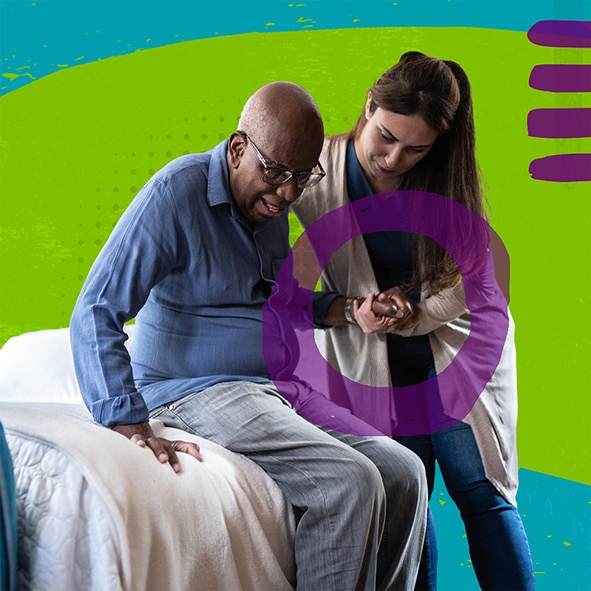The HHS Health Workforce Initiative is exploring ways to increase the health workforce, expand recruitment and retention, and deliver career advancement opportunities with a strong focus on equity. We can’t solve for just one of these areas. They are all connected, and we must think about solutions holistically. These solutions help you start your health career and continue to grow in it.

$150 million
awarded to expand the public health workforce within the aging and disability networks
$68.5 million
in grant funding to support behavioral health education, recruiting, training, and community programs
Growing the workforce
To send health professionals to the communities that need them the most, our work has included:
- A significant increase in numbers of providers serving communities of high need: National Health Service Corps (NHSC) has a strong record of placing clinicians (medical, dental, and mental/behavioral health) in regions where they have been lacking.
- Training physicians and dentists in community-based settings with a focus on rural and underserved communities: The Teaching Health Center Graduate Medical Education (THCGME) Program helps communities grow your health workforce by giving learning opportunities to professionals who are trained specifically in how to serve communities of need.
- Created 575 physician residency positions approved to expand the physician workforce in underserved rural communities: Health Resources and Services Administration (HRSA) funding supported the creation of new accredited rural residency programs to increase the number of doctors in areas of great need.

Growing the number of certified prevention specialists
Doctoral student in school psychology Tenisha Jones, M.Ed is assessing grant applications to increase positive outcomes for targeted populations through the Prevention Fellowship Program.

Improving quality of care
To increase the standard of health that people experience in the U.S, we have contributed to care quality through:
- Increasing coverage in the highest-need areas: Centers for Medicare & Medicaid Services (CMS) announced 200 new graduate medical education (GME) residency slots awarded to 99 qualifying hospitals to staff more health positions in underserved communities.
- Hiring, training, certifying, and compensating community-based doulas: HRSA is providing $4.5 million to increase doulas in areas with high rates of adverse maternal and infant health outcomes.
- Collaborative support for adolescents and young adults (AYA) as they transition from pediatric care into adult care: HRSA’s Leadership Education in Adolescent Health (LEAH) Program prepares providers to deliver culturally competent, community-tailored practices for AYA while also involving adolescents and their parents from diverse ethnic backgrounds and cultures in the planning, implementation and evaluation of program activities.
- Raise compensation to retain workers who care for the most vulnerable: $37 billion from the American Rescue Plan allowed states to recruit, train, and increase pay for care workers who assist seniors and individuals with disabilities in their homes and in community-based facilities.

12% increase in trainees hosted in 2023
HRSA-funded health centers hosted over 66,000 pre- and post-graduate trainees in 2023, including nearly 6,000 additional medical trainees.

Expanding opportunities
To help health professionals advance in your careers, our efforts have included:
- More than $100 million to grow the nursing workforce: HRSA awarded these investments to train more nurses and address the increasing demand for registered nurses, nurse practitioners, certified nurse midwives, and nurse faculty.
- Over 84% of Leadership Education in Neurodevelopmental and Related Disabilities (LEND) graduates improved field leadership in service of Maternal and Child Health (MCH) populations: The graduates of this HRSA program became leaders within 5 years of completing LEND, and 93% of LEND graduates worked across different fields to serve MCH populations.
- Preparing fellows and long-term trainees for leadership roles as teachers, investigators, and clinicians by expanding the Developmental-Behavioral Pediatrics (DBP) Training Program workforce: Providers will increase your capacity to evaluate for, diagnose or rule out developmental disabilities (DD), including autism, which will address the medical and psychosocial aspects of child development.
- Federally funded financial support: Through scholarships and loan repayment programs for individual health students and working professionals to have a career in health, as well as grants for organizations to increase your health staff.
- A listing of resources for health workers: This directory is intended to help individual professionals learn about the training, upskilling, and professional development opportunities you have while working in health.
Bringing animal-assisted therapy to public health
Do you wish that there were animals in your workplace? Lieutenant Commander Abigail, a labrador retriever who works as the mascot for the United States Public Health Service Commissioned Corps brightens the days of HHS workers and patients by providing therapeutic care.

